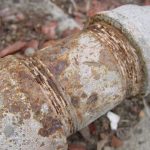Many homeowners renovate their homes to increase the value and make their spaces more pleasant and easier to use. The two most popular transformations occur in the kitchen and bathroom because this is often where the most considerable improvements can be made. This is a very exciting process; it’s an opportunity to put your own creativity into a project and get the exact kitchen or bathroom that you always dreamed of. But, most people don’t think about re-piping their homes at all, and this is surprising when you consider the ramifications. In this article, we will demonstrate why you need to consider re-piping your home.
The Underlying Infrastructure
In every home, there is a network of plumbing pipes to deliver clean water and remove wastewater. Most of these plumbing pipes are hidden from sight, and this makes it easy to forget about them altogether until something goes wrong. When homeowners embark on a kitchen or bathroom remodeling project, they spend a great deal of time choosing plumbing fixtures and appliances, and yet they don’t think about the underlying plumbing infrastructure. This is a problem, it’s almost like building a house on top of crumbling foundations, and this can lead to serious problems later. If the home plumbing pipes are in poor shape, they may not be able to meet the requirements of the new plumbing fixtures that are added to the kitchen or bathroom. Thinking about your plumbing pipes may not be as exciting, but it is essential if you want your projects to function correctly, and this may involve re-piping your home.
The Value of Plumbing Pipe Upgrades
Every plumbing pipe will wear out sooner or later, and like everything else, it’s necessary to replace them eventually. After all, you wouldn’t continue to use a car or microwave if those devices only worked some of the time, and they were not fit for purpose. So, if your plumbing pipes are starting to fail and they have come to the end of their useful lifespan, it’s time to replace them with something much better.
Even the best plumbing pipes installed by the city fail eventually, think about the water breaks in the neighborhood and how much disruption they can cause. This is especially true if you live in an older home that’s been renovated for modern living. Many people remodel a home to sell it, and they don’t upgrade the older plumbing system at all. Any plumbing pipes that are more than fifty years old are well beyond their useful lifespan. A good quality copper pipe can last for a little longer, and a galvanized pipe could work well for a century.
It’s worth mentioning that many housebuilders were focused on profit, and it’s not unusual to finder cheaper materials used in hidden sections of any building. Another key factor is water quality; if the water in the area is aggressive, it can dissolve the metal and weaken it over time. A break is inevitable, but this is often preceded by a series of tiny pinhole leaks that are harder to detect. Water damage is extremely expensive to fix, and it can cause a great deal of destruction in a very short period of time.
An aging set of plumbing pipes can also lose a great deal of water over the course of the year, and this can drive up the water bills. When you consider the potential problems associated with water leaks and the loss of water, it easier to understand the value of re-piping. Taking preventative measures is always better than waiting for something to fail and dealing with the consequences. This typically costs more in the medium to long term, and it’s easier to just get the home re-piped sooner rather than later.
Getting Rid of Old Damaged Pipes
Older plumbing pipes have often been damaged over the years in a number of different ways. We’ve already mentioned poor water quality issues that can weaken and eventually destroy the integrity of a pipe. But, there are other types of older plumbing pipes that need to be replaced.
In recent decades many people switched out their metal plumbing pipes for polybutylene alternatives. These were preferable to the toxic lead pipes that they replaced, but they are not an ideal solution. These types of plastic pipes are very prone to becoming brittle over time, and this makes them more likely to break.
Another key consideration is the widespread practice of using chemical drain cleaning products to clear clogs. Many people use these products, and they can cause damage to pipes. These cleaners contain caustic chemicals that can damage your skin, and they have a similar effect on metallic or plastic surfaces. This is why it’s always a better idea to remove clogs manually rather than resorting to using chemical cleaners.
Fixing Other Plumbing Problems
Many homeowners struggle with other plumbing problems that could be caused by aging pipes that need to be replaced. Everyone enjoys a higher water pressure for their home, it makes showering more pleasurable, and there is no need to worry if someone is running another water using appliance at the same time. If you cannot get the water pressure that you want and the problem isn’t the municipal water supply, your pipes could be at fault. After all, if you have a number of hidden water leaks in your home, this will lower the available water pressure.
Another common plumbing problem related to older pipes is dirty looking or strangely colored water. If the internal surfaces of your pipes are older, they are more prone to flaking and damage as water passes through them. This means that pieces of the pipe will break off into the water, and this can make the water unpleasant to use. Although the water is technically safe, it simply looks bad, and showering in it can leave you feeling less than fresh.
If you’re thinking about re-piping your home, contact your
local certified plumber for expert help and advice.
By Giovanni Longo President Flood Brothers Plumbing
Giovanni Longo is a 3rd generation master plumber who has been practicing his craft and trade in the greater Los Angeles area for well over a decade and a half. A plumbing and hydraulics-engineering innovator, Giovanni’s particular world-class expertise focuses on dealing with challenging sewer system designs as well as resolving complex commercial and residential draining issues. As a certified Flood Mitigation expert, he is also well versed in a wide variety of water damage and remediation solutio





